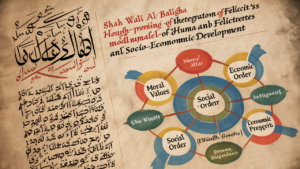
‘Hujjat Allah al-Baligha,’ translated as ‘The Conclusive Argument from God,’ represents the pinnacle of Shah Wali Allah‘s intellectual endeavors. This seminal work intricately weaves together the intellectual and spiritual traditions of Islamic heritage, elucidating the profound meanings embedded within the hadith reports of Prophet Muhammad.
The very essence of this work is encapsulated in its title, derived from the Qur’anic verse “Indeed, the conclusive argument is from God.” This sets the stage for Shah Wali Allah‘s exploration, where he delves into the realms of religious obligation, requital, and the esoteric dimensions of divine laws. What distinguishes ‘Hujjat Allah al-Baligha’ is Shah Wali Allah‘s masterful integration of philosophical, Sufi mystical, and traditional textual approaches, creating a harmonious blend that offers a comprehensive understanding of the Islamic intellectual tradition. This book stands as a beacon of knowledge and enlightenment, illuminating the intricate interplay between various facets of Islamic thought.
In the first volume, Shah Wali Allah embarks on a profound exploration of the corpus of prophetic sayings, commonly known as hadith. This endeavor transcends mere collection and narration; it represents a comprehensive attempt to interpret and apply these sayings in a manner that reaches beyond their literal meaning, ascending into the realm of higher purpose. Shah Wali Allah’s approach here is not merely theoretical but establishes a metaphysical structure that meticulously details the internal dynamics within systems of human experience.
He presents a vision where these systems, initially perceived as composed of conflicting parts akin to forces at odds, are harmonized through the resolution of these conflicts. The crux lies in aligning these components toward a higher purpose, achieving balance within the system. Through this, Shah Wali Allah offers a sophisticated framework that integrates intellectual rigor with spiritual insight, providing a holistic perspective on the application of hadith in the pursuit of higher objectives within the Islamic tradition.
Envision a symphony where dissonant notes ultimately converge into a harmonious composition; such is the essence of Shah Wali Allah’s vision articulated in ‘Hujjat Allah al-Baligha.’ To him, conflict is not a mere antagonistic interaction but an essential mechanism for achieving progress. He posits that once an internal equilibrium is realized, the latent perfection inherent in individuals, societies, and species is actualized, thereby elevating the entire system to a transcendent level.
Shah Wali Allah’s exposition, particularly in the first volume, constitutes an intricate amalgamation of conflict resolution, philosophical profundity, and an overarching quest for higher purpose. His work transcends a mere exegesis of hadith; it delves into the profound metaphysical constructs underpinning human existence and the cosmic order. Through this volume, Shah Wali Allah’s sophisticated theories on systemic conflict and resolution emerge, enriching his interpretation of prophetic traditions with layers of philosophical depth.
Central to his elaborate schema is the concept of ‘maqasid’—the beneficial purpose. Shah Wali Allah articulates this as the central tenet that propels the universe towards progressive harmony. This concept is not a theoretical abstraction but a foundational principle that imbues religious significance into the conflicts inherent in various systems. In Shah Wali Allah’s framework, conflict is elevated to a teleological process, a divinely ordained means to achieve a higher purpose and equilibrium within the cosmic order.
Moreover, Shah Wali Allah’s vision integrates multiple intellectual traditions—philosophical, Sufi mystical, and traditional Islamic jurisprudence—creating a holistic epistemological framework. This integration underscores his unique contribution to Islamic thought, positioning ‘Hujjat Allah al-Baligha’ as a seminal work that bridges the intellectual and spiritual dimensions of the Islamic heritage.
Shah Wali Allah’s theory is a sophisticated narrative of harmonizing dissonance within systems, where conflict serves as a catalyst for achieving the maqasid, ultimately guiding the entire cosmos towards an elevated state of order and purpose. This profound synthesis of ideas not only redefines the interpretation of hadith but also offers a comprehensive philosophical treatise on the nature of human and cosmic order.
This volume serves as a captivating exploration into the underlying wisdom of the Islamic legal system. Shah Wali Allah ventures beyond the confines of linguistic interpretations, exploring mystical dimensions of symbol interpretation. It’s not merely about decoding the words; it’s about unraveling the subtle and mystical layers of meaning embedded in religious symbols.
The structure of the volume, aptly subtitled ‘The General Principles from Which Are Derived the Beneficial Purposes Considered in the Rulings of the Divine Law,’ unfolds across seven sections comprising Eighty-One Chapters. This meticulous organization provides a roadmap through the metaphysical, psychological, sociological, and moral foundations of Shah Wali Allah’s system.
Shah Wali Allah’s theory isn’t confined to abstract notions but extends to the practical application of Islamic principles. He carefully elucidates how conflict within these systems must be resolved or harmonized to achieve a higher purpose, echoing the very essence of Islamic teachings on balance and righteousness.
This volume, a literary tapestry of profound insights, unfolds through seven meticulously crafted sections, housing a total of 81 chapters.
- Introduction to Metaphysical Foundations: The opening section serves as a gateway into Shah Wali Allah’s intellectual realm. Here, he lays the groundwork by presenting the metaphysical, psychological, sociological, and moral basis of his intricate system. It’s a philosophical cornerstone that sets the stage for the grand symphony of ideas to follow.
- Inner Meanings of Religious Practices: As we venture deeper, Shah Wali Allah takes us on a transformative exploration into the inner dimensions of basic religious practices. It’s not just about the rituals themselves; it’s an odyssey into the spiritual significance and profound meanings embedded within these acts of devotion.
- The Role of Prophecy: In this section, Shah Wali Allah unravels the profound role of prophecy in his theoretical framework. The prophetic dimension becomes a guiding light, illuminating the path towards understanding the cosmic order and the higher purpose embedded within the fabric of existence.
- Delving into Divine Injunctions: As we progress through the chapters, Shah Wali Allah turns his attention to the divine injunctions that shape the ethical and moral landscape. Here, the exploration goes beyond the surface, delving into the nuances of these injunctions and their profound impact on human conduct and societal harmony.
Every section serves as a stepping stone, each chapter a brushstroke on the canvas of Shah Wali Allah’s intellectual masterpiece. The journey through metaphysics, spirituality, and morality unfolds with each turn of the page. It’s not merely an academic exercise; it’s a transformative experience that invites readers to dive into the depths of understanding.
Deconstructing Hadith: Analyzing Shah Wali Allah’s Methodology in Volume 2 of Hujjat Allah al-Baligha

The second volume of ‘Hujjat Allah al-Baligha’ is a profound treatise on the application and interpretation of Hadith—the sayings and actions of the Prophet Muhammad (peace be upon him). Shah Wali Allah’s approach in this volume is marked by meticulous analysis and an intricate understanding of the historical and social contexts in which these Hadith were narrated.
Shah Wali Allah underscores the imperative of contextualizing Hadith to accurately derive their intended meanings and appropriately apply their teachings across diverse circumstances. This nuanced approach is critical for ensuring that the profound wisdom embedded in these narrations is comprehensively understood and correctly implemented.
A notable feature of this volume is Shah Wali Allah’s rigorous classification of Hadith. He distinguishes between various categories such as authentic (Sahih), weak (Da’if), and fabricated (Mawdu’), thereby providing scholars and students with a robust framework for evaluating the reliability and applicability of individual Hadith in legal and ethical contexts. This classification system is indispensable for jurists and ethicists who rely on Hadith as a foundational source alongside the Quran in formulating legal rulings and ethical guidelines.
Beyond jurisprudential applications, Shah Wali Allah delves into the spiritual and moral dimensions of Hadith. He elucidates the ethical teachings inherent in the Prophet’s sayings, offering a holistic understanding of Islam that integrates both legal principles and moral conduct. This comprehensive approach ensures that the Hadith are not merely legalistic texts but also profound sources of ethical and spiritual guidance.
Shah Wali Allah’s work transcends geographical and temporal boundaries, illuminating the timeless wisdom embedded in Hadith and ensuring their relevance to contemporary challenges faced by Muslims worldwide. His scholarly efforts render the teachings of Islam dynamically applicable, bridging the gap between the historical context of the Hadith and modern-day issues.
Digging deeper into the intellectual landscape of ‘Hujjat Allah al-Baligha,’ one encounters the intriguing concept of ‘irtifaqat.’ Shah Wali Allah introduces ‘irtifaqat’ as a conceptual framework for examining the stages of human advancement. The term ‘irtifaqat,’ rich in interpretative potential, serves as a lens through which Shah Wali Allah articulates his understanding of societal development. This multifaceted concept encapsulates his vision of human progress, encompassing the interplay of individual and collective efforts towards achieving a harmonious and elevated state of existence.
Shah Wali Allah’s exploration of ‘irtifaqat’ adds another layer of complexity to his scholarly work, intertwining the philosophical, ethical, and spiritual dimensions of human development. By integrating these diverse elements, he presents a comprehensive model of socio-economic and moral progression, reinforcing the perennial relevance of Islamic teachings in guiding humanity towards a balanced and purposeful life.
The Concept of al-Irtifaqat in Shah Wali Allah’s Socio-Economic Framework

The term irtifaq derives from the Arabic root r.f.q., signifying qualities such as gentleness, convenience, kindness, assistance, and benefit. In its broader usage, irtifaq encompasses the adoption of practical approaches, supportive mechanisms, advantageous methods, beneficial technologies, and refined manners in one’s life. Shah Wali Allah, however, employs this term in a specialized context to articulate various stages of socio-economic development.
In Shah Wali Allah’s schema, the progression of human socio-economic development is conceptualized as a hierarchical sequence of four distinct stages, evolving from primitive societal configurations to a sophisticated global community. The initial stage is characterized by rudimentary economic struggles and survival-based activities, while the final stage is marked by the establishment of a just political order on an international scale, aimed at safeguarding the socio-economic interests of disparate states and fostering global peace and justice.
This conceptual framework of irtifaqat delineates how socio-economic evolution unfolds through increasingly complex and refined stages. Each stage reflects a phase of development that builds upon the previous one, culminating in a global system that balances justice and socio-economic equilibrium among nations. Shah Wali Allah’s economic theories are intricately linked to this model of irtifaqat, providing a structured lens through which the dynamics of economic progression and societal advancement can be understood.
In examining Shah Wali Allah’s economic ideas, it is essential to consider them within the context of these stages of socio-economic development. Each stage presents unique challenges and opportunities, and Shah Wali Allah’s insights offer a framework for navigating these complexities, ultimately contributing to a more nuanced understanding of economic and social development in the Islamic tradition.
Al-Irtifaq al-Awwal: The First Stage of Socio-Economic Development
The initial stage of socio-economic development, termed al-Irtifaq al-Awwal or the First Stage, is conceptualized as a transition from a state of mere survival akin to that of the animal kingdom to a more refined and communicative human existence. This stage is characterized by the enhancement of clarity in communication, intellectual refinement, and the development of sophisticated cognitive and social abilities.
During this formative period, humanity acquires the fundamental capacity for articulate speech, enabling the expression of thoughts in a natural and unimpeded manner. This phase marks the commencement of human engagement with food resources tailored to individual physical constitutions, including the knowledge of their cultivation, irrigation, harvest, and preservation techniques. Additionally, this stage encompasses the methods of food preparation and the utilization of animal products such as meat, milk, and butter.
In the context of agricultural practices, individuals learn the intricacies of growing and harvesting crops, alongside the domestication of animals. The use of animals becomes instrumental in performing laborious tasks, such as ploughing fields, transportation, and the provision of secondary resources like milk and wool. The construction of shelters to guard against environmental elements and the use of clothing derived from animal hides, plant materials, or synthetic means are also integral aspects of this stage.
Furthermore, this stage involves the establishment of social structures where individuals seek matrimonial relationships to fulfill sexual and reproductive needs. The development of rudimentary crafts and technologies for agriculture and animal husbandry, alongside primitive forms of exchange and cooperation, reflects the nascent stages of economic organization.
Social organization during this phase is typically led by individuals exhibiting superior judgment and authority, who establish frameworks for dispute resolution and punishment of transgressors. Intellectual leadership in discovering methods of al-Irtifaq appropriate to the prevailing conditions is crucial, as it serves as a model for others to emulate.
From Shah Wali Allah’s exposition of this initial stage, it is evident that he frames it within the context of a rudimentary civilization reflecting the socio-economic conditions of early village life. This stage addresses fundamental human needs—such as sustenance, shelter, and clothing—and resolves basic economic questions through traditional practices. The division of labor remains minimal, and market development is nascent. This stage distinguishes human societies from animal existence and serves as a foundational prerequisite for advancing to the subsequent stage of socio-economic development.
Al-Irtifaq al-Thani: The Second Stage of Socio-Economic Development
The transition to al-Irtifaq al-Thani, or the Second Stage of Socio-Economic Development, marks a pivotal advancement from addressing basic natural needs such as sustenance, clothing, and shelter. This stage represents an expansion of the initial stage, incorporating sophisticated behavioral norms and moral principles. The increasing complexity of life necessitates the establishment of appropriate institutions and prudent measures conducive to societal progress.
In this stage, Shah Wali Allah delineates five distinct forms of hikmat (wisdom) that guide various aspects of human life:
- Al-Hikmat al-Ma’ashiyah: This form of wisdom pertains to the manner of living, emphasizing consistency in conduct and practical knowledge related to daily activities such as eating, drinking, dressing, dwelling, etiquette, modes of conversation, and travel.
- Al-Hikmat al-Manziliyah: Known as the wisdom of domestic life, this encompasses the management of married life, child-rearing, familial obligations, and the norms of companionship and domestic affairs.
- Al-Hikmat al-Iktisabiyah: This wisdom concerns the pursuit of livelihood, including the various professions individuals undertake based on their personal capacities and the tools or skills necessary for these occupations, such as carpentry or metalworking.
- Al-Hikmat al-Ta’amuliyah: This pertains to the wisdom of mutual dealings, encompassing economic transactions such as buying and selling, gift-giving, tenancy, lending, debt management, mortgages, and endowments (waqf).
- Al-Hikmat al-Ta’awuniyah: The wisdom of cooperation involves practices related to surety, silent partnerships, commercial ventures, power of attorney, and property tenure.
Shah Wali Allah’s classification of these five types of wisdom highlights a nuanced understanding of socio-economic structures. The first two categories—al-Hikmat al-Ma’ashiyah and al-Hikmat al-Manziliyah—primarily relate to sociological studies, focusing on personal and familial conduct. In contrast, the latter three—al-Hikmat al-Iktisabiyah, al-Hikmat al-Ta’amuliyah, and al-Hikmat al-Ta’awuniyah—are concerned with economic principles.
It is essential to recognize that the Second Stage builds upon the First Stage, with continuity rather than discrete boundaries. The activities and norms established in the First Stage evolve through refinement and enhancement in the Second Stage. For instance, while basic needs like food, clothing, and shelter were addressed initially, the Second Stage elevates these concerns to align with higher ethical standards and religious piety, thus integrating noble moral principles into daily life and interactions.
This progression underscores the transformation from basic survival to a structured socio-economic framework, emphasizing the refinement of social practices and the advancement of economic principles within a broader moral and ethical context.
Al-Irtifaq al-Thalith: The Third Stage of Socio-Economic Development
Upon the completion of the second stage, human society evolves into a more complex socio-economic entity characterized by the establishment of city-states. Shah Wali Allah articulates that a city transcends mere physical structures such as walls and buildings; rather, it represents a dynamic network of relationships founded on mutual interactions and cooperative engagements. This emergent complexity necessitates a more sophisticated framework to address internal and external challenges, leading to the third stage of socio-economic development.
In this stage, the city-state is conceptualized as an organic entity akin to a living body, susceptible to various forms of internal and external maladies. Therefore, the role of leadership, represented by the imam and his associates, becomes crucial. The imam functions as the custodian of the city’s integrity, interests, and autonomy. The following institutions are deemed essential by Shah Wali Allah to ensure the city’s continued progress and to safeguard against corruption, abuse, disorder, and decay:
- Al-Qada (Judiciary): The judiciary serves as a mechanism for resolving disputes and disagreements that arise from issues such as avarice, envy, and neglect of others’ rights. It is imperative for maintaining social harmony and justice within the city-state.
- Al-Shahryariyah (Executive Authority): This institution is responsible for enforcing laws and ensuring public order. It addresses deviations and criminal activities, including theft, murder, and rebellion, by implementing corrective and punitive measures to preserve the city’s stability.
- Al-Jund (Defense): The defense force is crucial for protecting the city-state from external threats and internal insurrections. Composed of capable and valorous individuals, this institution is responsible for maintaining security and order.
- Al-Tawalli wa’l-Naqabah (Welfare and Public Works): This institution oversees various public services and infrastructure projects, including the construction of essential facilities like wells, markets, and bridges. It also manages social welfare functions such as orphan care, almsgiving, inheritance distribution, and the oversight of public finances.
- Al-Maw’izah wa’l-Tazkiyah (Religious and Moral Instruction): The role of religious and moral education is to counteract the influence of corruption and vice. This institution provides spiritual guidance and ethical instruction, ensuring that individuals adhere to the principles of piety and righteousness.
Shah Wali Allah advises that the imam must uphold justice, effectively manage the administrative apparatus, and ensure equitable distribution of employment opportunities across various sectors. Emphasis should be placed on supporting traders and farmers, and on facilitating their education and professional development. Shah Wali Allah also critiques the socio-economic conditions of his time, noting two primary factors contributing to urban decay: the undue burden placed on the public treasury and excessive taxation that discourages productive activities and fosters unrest.
By advocating for balanced taxation and prudent administrative practices, Shah Wali Allah underscores the necessity of a well-functioning government in nurturing a thriving city-state and addressing the socio-economic challenges inherent in this advanced stage of development.
Al-Irtifaq al-Rabi’ or the Fourth Stage of Socio-Economic Development
In the fourth stage of socio-economic evolution, human society and governance attain an international dimension, necessitating the establishment of a supreme authority, referred to as Khalifat al-Khulafa, or the “Caliphate of the Caliphs.” As the third stage concludes, characterized by the governance of multiple city-states or regional rulers, the emergence of conflicts driven by enmity, rivalry, and avarice among these rulers underscores the need for a unifying sovereign entity.
When regional rulers, each possessing their own resources and military forces, engage in conflict, the resultant warfare leads to significant loss of life and resources, disrupting socio-economic stability and undermining the developmental progress achieved in previous stages. The establishment of a Khalifat al-Khulafa is thus imperative. This supreme ruler must possess substantial power and resources to deter and manage conflicts among the states, ensuring peace and stability across the broader political landscape.
Shah Wali Allah delineates that the role of this international governance is not to engage directly in economic activities but to maintain peace, administer justice, and prevent exploitation. The caliph’s primary responsibility includes managing resources efficiently, imposing and collecting taxes to sustain the administrative machinery, and administering financial penalties as necessary. These penalties should aim at rectification and reformation rather than mere revenue collection.
Furthermore, Shah Wali Allah emphasizes that the caliph must embody several key attributes to effectively fulfill his role. The caliph should be a figure of exceptional strength and capability, commanding both material resources and human support to uphold peace and administer justice. The operational framework of this global authority involves enforcing laws impartially, resolving conflicts equitably, and ensuring the welfare of all governed states.
Shah Wali Allah also proposes specific measures to enhance the efficacy of the caliph’s governance. These include strategic management of taxation, prudent allocation of resources, and the implementation of policies designed to mitigate unrest and promote stability. By doing so, the Khalifat al-Khulafa can ensure the continued prosperity and harmony of the international community, thereby advancing the overarching goals of socio-economic development.
Human Felicity and Virtues: A Theoretical and Practical Discourse

Within the intricate framework of Shah Wali Allah’s seminal work, Hujjat Allah al-Baligha, the fourth section elucidates profound insights into the quest for ultimate human felicity and the cultivation of cardinal virtues. This segment serves as both a theoretical exploration and a pragmatic guide, articulating how virtues are foundational to achieving a state of human flourishing.
Shah Wali Allah meticulously delineates a spiritual odyssey wherein virtues such as purity, humility, magnanimity, and justice are not merely ethical abstractions but essential pillars underpinning the edifice of spiritual and moral development. These virtues, as conceptualized by Shah Wali Allah, function as a moral compass, steering individuals through the labyrinthine complexities of human existence. Purity, by purging the heart of moral impurities, establishes a foundation for spiritual elevation. Humility anchors the soul, fostering a sense of groundedness and self-awareness. Magnanimity enhances character, extending beyond mere self-interest to encompass a broader, altruistic perspective. Justice, in its turn, orchestrates equitable interactions within the human community, ensuring a harmonious social fabric.
In his discourse, Shah Wali Allah does not merely expound on these virtues in abstract terms but addresses the practical impediments that often obstruct the path to true human felicity. He critically examines the veils of tradition, cultural norms, and misconceptions about divine nature, which act as barriers obscuring the realization of human potential. These impediments, likened to shadows obscuring the soul, must be dispelled to reveal the inherent brilliance of human potential.
Shah Wali Allah’s exposition transcends theoretical constructs, offering a practical framework for individuals to navigate life’s complexities with a refined moral compass. His insights, enduring through the ages, provide a timeless template for overcoming the obstacles that frequently obscure our pursuit of ultimate human felicity. This section of Hujjat Allah al-Baligha thus functions as both a philosophical exploration and a practical guide, integrating theoretical wisdom with actionable principles to facilitate profound personal and spiritual fulfillment.
Conclusion: The Integral Insights of Hujjat Allah al-Baligha
Hujjat Allah al-Baligha, Shah Wali Allah’s magnum opus, emerges as a cornerstone in the edifice of Islamic intellectual and spiritual tradition. This seminal work weaves together a tapestry of profound insights, seamlessly integrating theological, philosophical, and socio-economic dimensions. The comprehensive nature of the text offers a multifaceted exploration of the Islamic worldview, encompassing the intricate dynamics of human development, virtue, and governance.
At its core, Hujjat Allah al-Baligha presents a nuanced understanding of the evolution of human society and its ethical foundations. Shah Wali Allah’s conceptual framework of al-Irtifaqat—the stages of socio-economic development—provides a systematic analysis of human progress from primitive survival to complex, global societies. The delineation of these stages—from the rudimentary existence of al-Irtifaq al-Awwal (the first stage) to the sophisticated governance of al-Irtifaq al-Rabi` (the fourth stage)—offers a compelling narrative on the progression of human socio-economic structures. This progression underscores the transformative journey from basic subsistence to the establishment of just political orders and global harmony.
The first stage, characterized by basic survival and rudimentary socio-economic practices, highlights the essential human shift from animalistic existence to a structured social framework. Shah Wali Allah’s detailed examination of agricultural practices, animal domestication, and basic crafts reflects a foundational stage that forms the bedrock for subsequent development.
The second stage introduces a more complex societal structure, marked by the expansion of knowledge and refinement of social practices. Shah Wali Allah’s categorization of wisdom into al-Hikmat al-Ma’ashiyah, al-Hikmat al-Manziliyah, al-Hikmat al-Iktisabiyah, al-Hikmat al-Ta’amuliyah, and al-Hikmat al-Ta’awuniyah reveals a deep understanding of socio-economic intricacies, emphasizing the necessity for refined institutions and moral guidance.
The third stage, as articulated by Shah Wali Allah, represents the maturation of society into city-states, necessitating sophisticated governance and judicial mechanisms. The delineation of essential institutions—such as judiciary, executive, defense, welfare, and religious oversight—highlights the complexity of managing an advanced socio-political entity. This stage underscores the need for a balanced approach to governance that integrates justice, security, and social welfare.
In the fourth stage, Shah Wali Allah’s concept of Khalifat al-Khulafa (the ruler of all rulers) addresses the need for an overarching authority to maintain global peace and order. This final stage emphasizes the importance of a powerful and just leadership capable of managing international relations and ensuring equitable resource distribution. The role of this universal ruler extends beyond mere administration to encompass the moral and ethical stewardship of global society.
Central to Shah Wali Allah’s discourse is the focus on human felicity and virtue. His exploration of virtues such as purity, humility, magnanimity, and justice provides a practical framework for achieving ultimate human fulfillment. These virtues are not presented as abstract ideals but as actionable principles integral to personal and societal well-being. Shah Wali Allah’s insights into overcoming barriers such as traditional customs and misconceptions reveal a profound understanding of the obstacles to spiritual and moral development.
In conclusion, Hujjat Allah al-Baligha offers a comprehensive and nuanced perspective on the evolution of human society, governance, and personal virtue. Shah Wali Allah’s integration of socio-economic, philosophical, and spiritual dimensions provides a holistic framework for understanding the complexities of human development and the pursuit of ultimate felicity. His work stands as a beacon of intellectual and spiritual guidance, illuminating the path toward a more harmonious and just global society. Through its rigorous analysis and practical insights, Hujjat Allah al-Baligha continues to inspire and guide individuals and communities in their quest for ethical and existential fulfillment.
References:
- Shah Wali Allah. (1996). Hujjat Allah al-Baligha (M. Iqbal, Trans.). Islamic Publications Ltd. (Original work published 1761).
- Khan, M. (2005). The socio-economic theories of Shah Wali Allah: A historical perspective. Journal of Islamic Studies, 16(1), 45-60.
- Mansoor, I. (2013). Shah Wali Allah and the contextualization of Hadith: An analysis of Hujjat Allah al-Baligha. International Journal of Islamic Thought, 8(2), 23-35.
- Aziz, S. (2008). The role of Hadith in Islamic jurisprudence: Shah Wali Allah’s interpretive methodology. Middle Eastern Law Review, 12(4), 67-85.
- Ahmed, F. (2011). Philosophical underpinnings of Shah Wali Allah’s economic thought. Journal of Islamic Economics and Finance, 7(3), 112-126.
- Javed, M. (2019). Shah Wali Allah’s Framework of Socio-Economic Development: A Critical Analysis. Routledge.
- Husain, A. (2007). The concept of al-Irtifaqat in Shah Wali Allah’s socio-economic theory. Asian Journal of Social Science, 35(2), 188-203.
- Raza, M. (2015). Al-Irtifaq al-Awwal: The foundations of socio-economic development in Shah Wali Allah’s philosophy. Studies in Islamic History, 14(1), 95-110.
- Yusuf, A. (2012). Re-evaluating Shah Wali Allah’s contribution to Hadith studies. Islamic Review of Philosophy, 9(2), 54-71.
- Mirza, B. (2020). Integrating Hadith and Jurisprudence: An in-depth review of Volume 2 of Hujjat Allah al-Baligha. Journal of Islamic Studies and Culture, 15(4), 202-218.
